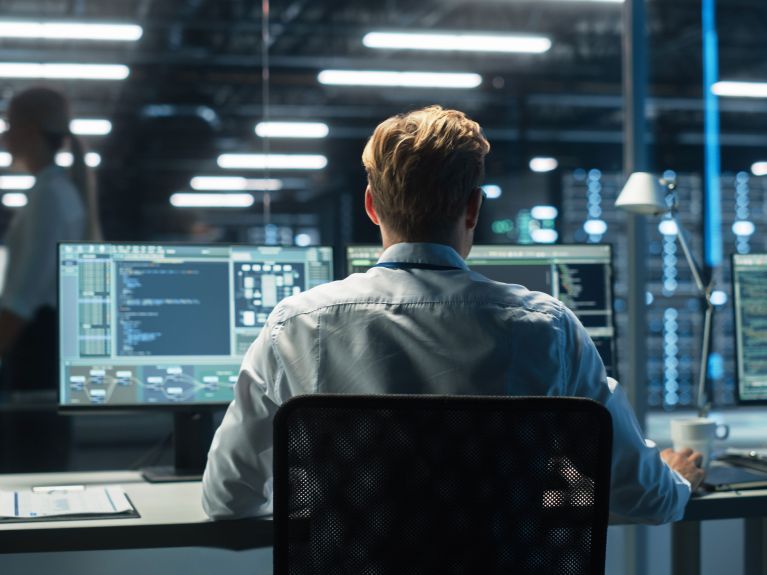Increased threat
Cybersecurity ahead of the G7 summit – German expert Christian Hummert on the risks posed by hackers and fake news.

The G7 summit will be taking place against the backdrop of a world that has changed fundamentally since Russia began its war against Ukraine. Russia’s disregard for the European peace order has moved the issue of security into the focus of the Group of Seven. We talked about cybersecurity with Christian Hummert, director of Germany’s national cyber agency.
Mr Hummert, one frequently hears of horror scenarios involving hackers manipulating nuclear power plants or turning off the supply of electricity to entire cities. How realistic is this?
It’s fairly unlikely that somebody could gain control of a whole power plant, for example. However, serious damage could already be caused by an attempt to manipulate some of the individual central components of an electricity grid. In 2015 and 2016, for instance, hackers had interrupted the supply of power to more than 700,000 households in Ukraine over a period of several hours.

What risk is posed by Russia?
There is clear evidence that Russia spreads fake news on a massive scale, i.e. that it uses cyberspace to make people feel less secure and to disseminate propaganda. With all other types of cyberattacks it is very difficult to identify exactly who is responsible. This is something we are working on just now in our research. In general, however, it is fair to say that the level of threat has increased. Both the National Cyber Defence Centre and the Federal Office for Information Security have issued recommendations to business, authorities and private individuals to take appropriate steps to protect themselves.
An attack on our entire democratic society
Would you describe fake news as a cyberattack?
I do believe that the term should be interpreted somewhat more widely. In the case of fake news, cyberspace has allowed attacks to become much more effective. If infrastructures are threatened at the same time as fake news is disseminated, this constitutes an attack on our entire democratic society. This is something that must be taken seriously.
Are we in fact aware of how vulnerable we are?
I don’t think we are. I hardly dare imagine what would happen if the internet were down for two days in Germany. These days we are interconnected to such an extent that this could almost lead to a situation tantamount to civil war.
A civil war just because we can’t get online for 48 hours?
Well, the effects would be pretty drastic. Much of industry would fail, supply chains would collapse, the banking system would be very hard hit, and police and fire brigade operations would be much more difficult because their digital communication systems would no longer work. Our energy supply would soon be affected, too. Wind farms for instance are controlled by satellite these days.
We are looking up to 15 years into the future.
Will this risk become even bigger in the future? After all, we are becoming increasingly networked.
This is indeed a question that we are exploring intensively at the Cyber Agency, and we are looking up to 15 years into the future. That’s a very long time in IT and a huge amount can happen. In terms of brain-computer interfaces, for example. Such systems already exist and are already being used successfully in medicine for therapeutic purposes. Nobody knows yet when such technologies will arrive on the consumer market, but we believe it is better to start thinking now about potential security risks. Certainly I would not wish to have the experience of something that is implanted in my body being hacked.
Wouldn’t it be a good idea to keep some analogue technology up our sleeves in case we have problems with the digital network?
That’s precisely what we experienced during the Ahr Valley flooding because what I just described actually happened there: the emergency services could no longer communicate via their digital systems. Luckily the firefighters still had some analogue walkie talkies to hand. That said, we shouldn’t rely on something like that too much. We cannot afford not to keep pace with the trend towards greater interconnectivity. What is important is to set up systems so that they do not collapse if one element happens to fail.
Dr Christian Hummert is the research director at the national Agency for Innovation in Cybersecurity (Cyber Agency), which was established in 2020. Holding a PhD in IT, Dr Hummert is an expert in IT forensics and previously taught as a professor at Mittweida University of Applied Sciences.
You would like to receive regular information about Germany? Subscribe here:


